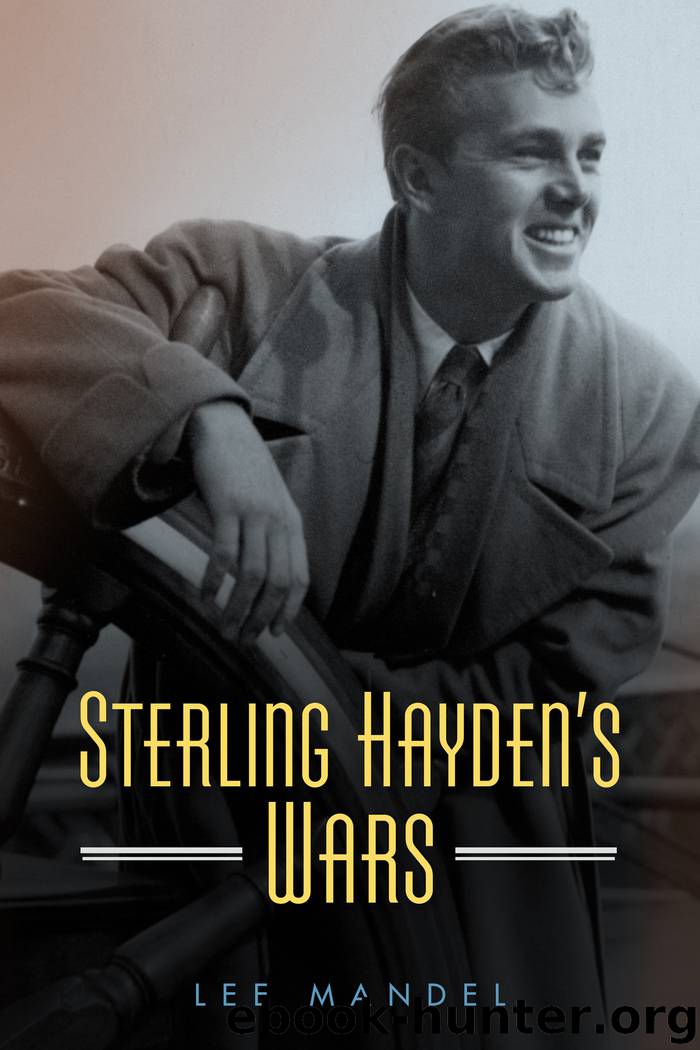Sterling Hayden's Wars by Lee Mandel

Author:Lee Mandel [Mandel, Lee]
Language: eng
Format: epub
ISBN: 9781496816986
Publisher: University Press of Mississippi
Published: 2018-01-15T07:00:00+00:00
CHAPTER FIFTEEN
Naming Names
IN APRIL OF 1950, THE APPEALS OF THE HOLLYWOOD TEN REACHED THE United States Supreme Court. The court refused to review the convictions and each member of the Ten was fined $1,000 and received prison sentences of up to a year. The stage was set for the resumption of the HUAC hearings in Hollywood. Armed with another recent Supreme Court decision, the committee was going to insist that subpoenaed witnesses name names.
• • •
The HUAC resumed its hearings on communist infiltration of Hollywood and the motion picture industry on March 8, 1951. The committee was chaired by Rep. John S. Wood of Georgia, and attorney Frank S. Tavenner Jr. served as counsel and chief interrogator. On that day, only one witness was called to testify and he wasn’t actually a member of the Hollywood film community. It was Victor Jeremy Jerome, Communist Party cultural commissioner and editor of The Communist. Jerome was represented by attorney Ralph Powe of New York City. Jerome promptly refused to answer most of the committee’s questions, citing his right against self-incrimination. While acknowledging that he was a writer and an editor, he refused to provide any additional specific details. Members of the committee grew frustrated with what they interpreted as Jerome’s evasions. Congressman Harold H. Velde of Illinois then asked Jerome, “You do agree that this is a legally constituted committee of the Congress, do you not?”
“I do, sir,” Jerome replied.
“Do you agree that we are attempting to determine what subversive forces exist in this country?”
“I do, sir,”
“Do you refuse to cooperate by answering questions as to those subversive forces?” asked Velde.
“My position is to cooperate the best I can,” responded Jerome. “I believe, however, I am entitled to invoke a constitutional privilege granted me against self-incrimination.”1
For the remainder of his total of two hours of testimony before the committee, Jerome refused to answer specific questions regarding his past employment and potential involvement in organizations that could be considered subversive. He also refused to answer questions regarding any particular people that were brought up by committee members. In each case, he cited his constitutional privilege against self-incrimination. The committee adjourned its hearing that afternoon and would not resume its hearings for nearly two weeks.
• • •
On March 21, 1951, the HUAC hearings resumed and the first witness called was actor Larry Parks. He was thirty-one years old when he achieved overnight stardom playing the lead in the 1946 biopic The Jolson Story. The highly successful film spawned a sequel, Jolson Sings Again, in 1949, also starring Parks. The actor had joined the Communist Party in 1941 but had left by 1946. Parks was determined to be a contrite, cooperative witness but he, too, was determined not to name any of the people he may have associated with during his tenure in the Communist Party. The session involving the genial, well-meaning witness and the aggressive, abrupt HUAC committee members proved to be a tortuous inquisition for Parks.
After Parks’s request to read an opening statement
Download
This site does not store any files on its server. We only index and link to content provided by other sites. Please contact the content providers to delete copyright contents if any and email us, we'll remove relevant links or contents immediately.
| Africa | Asia |
| Canadian | Europe |
| Holocaust | Latin America |
| Middle East | United States |
Fanny Burney by Claire Harman(26602)
Empire of the Sikhs by Patwant Singh(23085)
Out of India by Michael Foss(16853)
Leonardo da Vinci by Walter Isaacson(13336)
Small Great Things by Jodi Picoult(7141)
The Six Wives Of Henry VIII (WOMEN IN HISTORY) by Fraser Antonia(5515)
The Wind in My Hair by Masih Alinejad(5095)
A Higher Loyalty: Truth, Lies, and Leadership by James Comey(4963)
The Crown by Robert Lacey(4815)
The Lonely City by Olivia Laing(4801)
Millionaire: The Philanderer, Gambler, and Duelist Who Invented Modern Finance by Janet Gleeson(4478)
The Iron Duke by The Iron Duke(4354)
Papillon (English) by Henri Charrière(4274)
Sticky Fingers by Joe Hagan(4198)
Joan of Arc by Mary Gordon(4110)
Alive: The Story of the Andes Survivors by Piers Paul Read(4031)
Stalin by Stephen Kotkin(3965)
Aleister Crowley: The Biography by Tobias Churton(3640)
Ants Among Elephants by Sujatha Gidla(3467)
